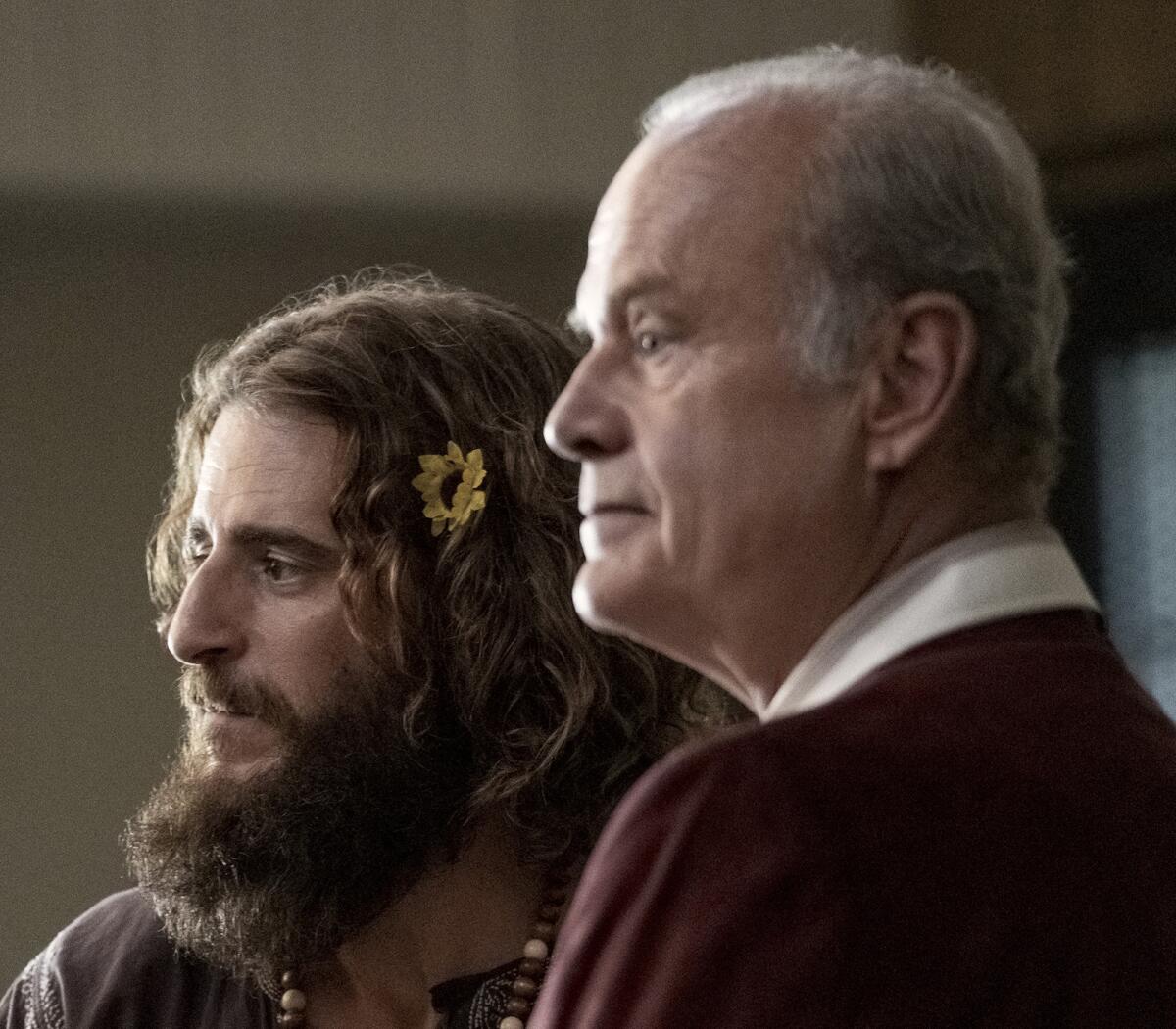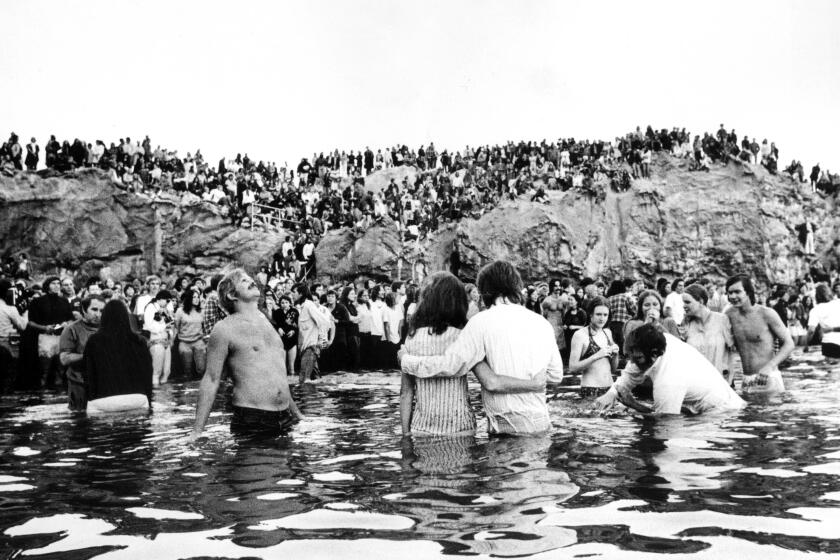Fleeced of real drama, faith-based ‘Jesus Revolution’ is a scattered slog

- Share via
It’s been fascinating to watch the rise and evolution of the faith-based movie and director Jon Erwin has been a part of that. He’s carved out a niche, collaborating with his brother Andrew and focusing on true stories with a musical element, including “I Still Believe,” about Christian music star Jeremy Camp, and “I Can Only Imagine,” about the band MercyMe. The Erwin brothers also co-directed the documentary “The Jesus Music,” which has a direct tie to Jon Erwin’s latest narrative feature, “Jesus Revolution.” Both films focus on the evangelical Christian movement that took place in Southern California in the late 1960s and early ‘70s.
For “Jesus Revolution,” Jon Erwin co-directs with Brent McCorkle, the writer of “I Can Only Imagine,” from a script by Erwin and Jon Gunn adapted from a book by Greg Laurie and Ellen Vaughn. Laurie is, in fact, the subject of “Jesus Revolution,” played by Joel Courtney. But the film, part biopic, part period piece, juggles three different protagonists while trying to tell the story of the Jesus movement, including Laurie, Laurie’s mentor, Chuck Smith, played by Kelsey Grammer, and hippie evangelist Lonnie Frisbee (Jonathan Roumie).
For your safety
The Times is committed to reviewing theatrical film releases during the COVID-19 pandemic. Because moviegoing carries risks during this time, we remind readers to follow health and safety guidelines as outlined by the CDC and local health officials.
As depicted in “Jesus Revolution,” Smith and Frisbee were huge influences on Laurie, a young teen growing up in Newport Beach with a troubled mother (Kimberly Williams-Paisley). When a comely young gal, Cathe (Anna Grace Barlow) breaks him out of military school, Greg dabbles in the drug-fueled hippie lifestyle, before a few near-death experiences lead him and Cathe to search for something more, a different kind of high.
At the same time, Chuck Smith is struggling to reconcile his concern over the hippie movement with his daughter Janette’s (Ally Ioannides) rebellion, and dwindling church attendance. When Janette brings home Lonnie, Chuck initially balks, but soon realizes that the young man’s message is closer to Christ’s than he thought. It also has to help that with his beard, long hair and hand-painted cape, Lonnie looks a lot like the common depictions of (white) Jesus (whom Roumie plays in the streaming series “The Chosen”). Soon, Chuck’s preaching at Calvary Chapel is less fire and brimstone and more peace and love, with a rock band, Love Song, to boot.
The storylines converge when Lonnie brings in Greg, who becomes a young leader in the burgeoning Jesus movement, as the three men navigate the ups and downs that this growth entails. It’s an interesting enough story, with text at the end of the film claiming that it was the “largest spiritual awakening in America” and a Time magazine cover story, “The Jesus Revolution,” woven into the narrative as well.
Unfortunately, despite the interesting history, the film itself is a dry, scattered slog, neutered of all the thorny, contradictory details of the real story. Give Lonnie Frisbee’s Wikipedia page a quick scan to see just how much material the filmmakers excised from his fascinating, troubled life. Though the intent is to focus on Greg Laurie’s life, including flashbacks to his childhood, screenwriters Erwin and Gunn can’t quite pick a lane, giving us three rather shallow storylines about three different men, with often unnecessary details that bog down the film’s momentum — at two hours, it feels long.
“The Jesus Music” documentary traces the roots of contemporary Christian music to Costa Mesa’s Calvary Chapel, now a megachurch, then a haven for hippies.
“Jesus Revolution” is also a completely uncritical portrait of the Jesus movement. Because this is a faith-based film, it simply presents the genesis of this “spiritual awakening” and explosion of these churches, without examining any of the potential dark sides or ramifications of how this evangelical Christian movement has impacted American culture and politics in the decades since.
Sepia-toned cinematography by Akis Konstantakopoulos gives “Jesus Revolution” the sheen of a 1960s-set period piece, and Courtney and Barlow capably hold up their end of the story of two “Jesus freaks” in love, but “Jesus Revolution” is clearly a piece of sanded-down marketing material for Calvary Chapel and Greg Laurie’s Harvest Crusades, with all the burrs of real history buffed out, rendering the film a smooth, but crushingly dull project.
Katie Walsh is a Tribune News Service film critic.
‘Jesus Revolution’
Rated: PG-13, for strong drug content involving teens and some thematic elements
Running time: 2 hours
Playing: Starts Feb. 24 in general release
More to Read
Only good movies
Get the Indie Focus newsletter, Mark Olsen's weekly guide to the world of cinema.
You may occasionally receive promotional content from the Los Angeles Times.










